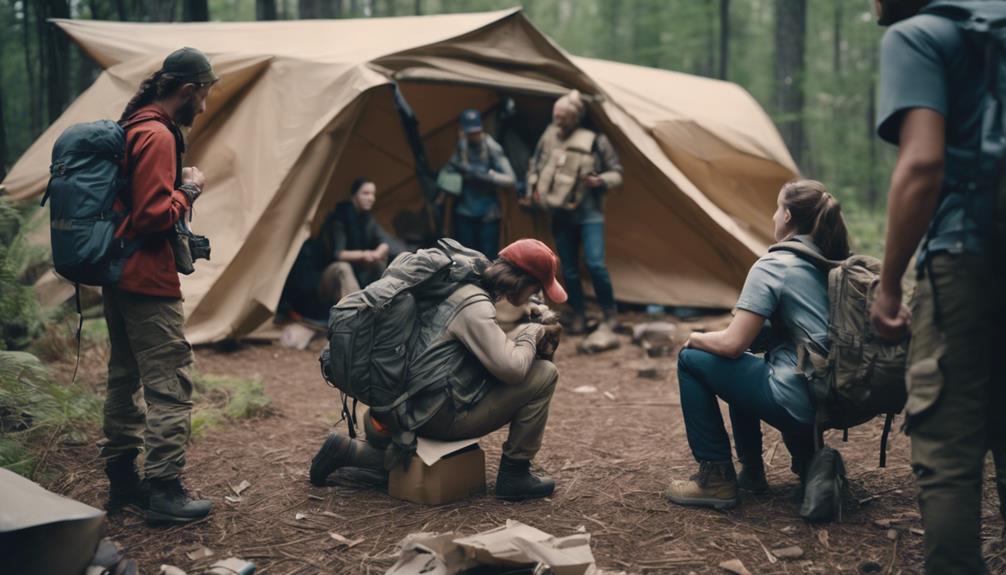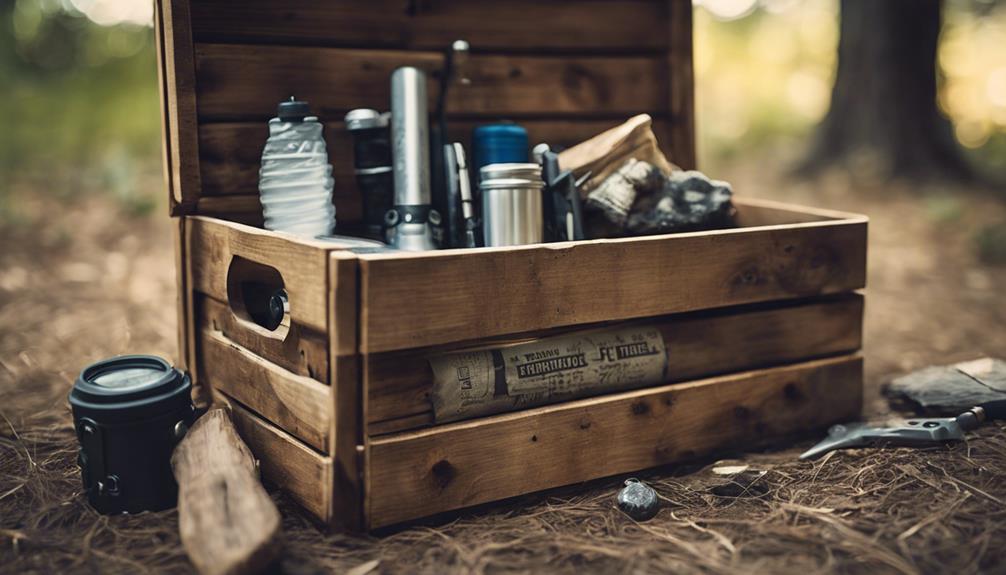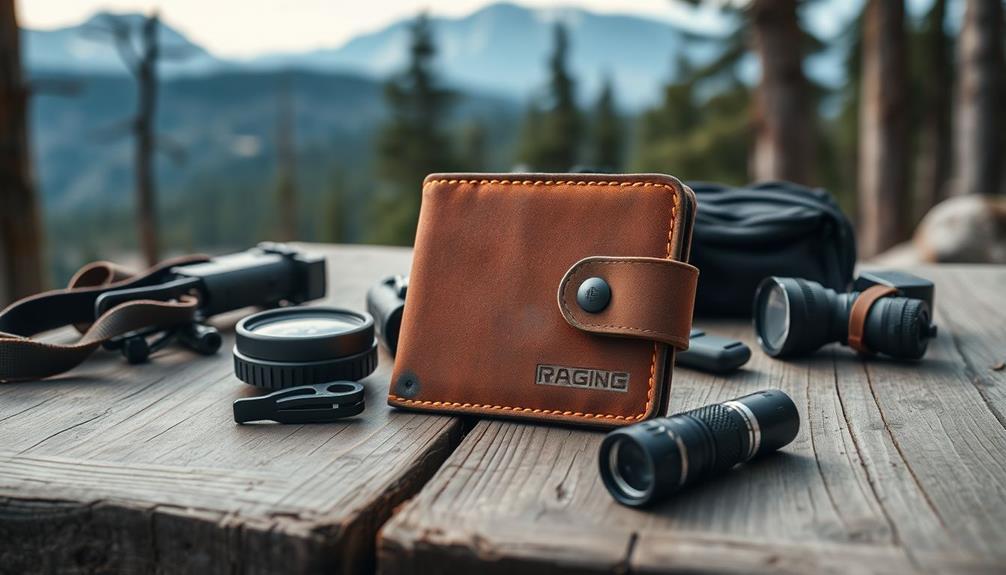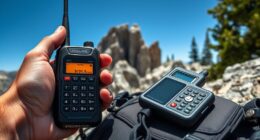Explore the nation's top survivalists, like Ray and Lindsay, masters of urban homesteading and preparedness. They secure bug out locations in Idaho with years' worth of supplies and advanced security. Ray builds a Preppers team and stands ready to protect fiercely. Train in wilderness survival, self-defense, and food preservation to thrive during crises. Develop secure bug out spots away from cities, equipped for self-sufficiency. Operational security is key to safeguarding resources. Learn about teamwork, sacrifices, global catastrophe prep, and lessons from the best in survival. Get inspired and boost your prep skills with their expertise!
Key Takeaways
- Ray and Lindsay are expert survivalists with a bug out location in Idaho.
- Preppers focus on wilderness skills, food preservation, self-defense, water purification, and fitness.
- Bug out locations are strategically secure with advanced systems and stocked supplies.
- Operational security is crucial to safeguard sensitive information and retreat locations.
- Preppers prioritize self-sufficiency through food preservation, water purification, and diverse skill sets.
Meet the Top Survivalists
Meet the top survivalists, Ray and Lindsay, who are experts in urban homesteading and self-sufficiency for potential collapse scenarios. Ray and Lindsay understand the importance of being prepared for any situation, especially when it comes to food shortage. They've a bug out location in the Idaho mountains, fully stocked with four years' worth of food supplies and advanced security systems to protect their provisions.
Ray actively recruits like-minded individuals to join his Preppers team, emphasizing the significance of teamwork in ensuring successful operations during times of crisis. He's aware of the potential dangers that may arise, such as rioting and looting in the event of food shortages, and is prepared to use force, even deadly force, to safeguard his family and resources.
Lindsay and Ray not only prioritize their own preparedness but also advocate for individual readiness within their community. They encourage others to take proactive steps in preparing for potential food shortages, recognizing the importance of self-sufficiency in times of need.
Training for Survival Skills

American preppers undergo rigorous training to develop essential survival skills for handling catastrophic events efficiently. Training in the United States includes a wide range of techniques and strategies to guarantee preparedness for any situation. Here is an overview of the key areas where preppers focus their training efforts:
| Training Area | Description | Purpose |
|---|---|---|
| Wilderness Survival | Learning skills like shelter building and identifying edible plants | To survive in remote areas |
| Food Preservation | Techniques for storing food long-term | Ensuring a stable food supply |
| Self-Defense | Strategies for protecting oneself in dangerous situations | Safeguarding against potential threats |
| Water Purification | Methods to make water safe for consumption | Guaranteeing access to clean drinking water |
| Physical Fitness | Exercises to maintain strength and endurance | Enhancing overall physical preparedness |
Building Secure Bug Out Locations

To fortify their readiness for emergencies, preppers prioritize constructing secure bug out locations as remote retreats for shelter and supply storage. These locations serve as vital lifelines during catastrophic events, providing a safe haven for survival.
Here's how preppers prepare for a global crisis through their bug out locations:
- Strategic Location: Selecting a bug out location far from densely populated areas reduces the risk of encountering threats from other survivors or looters, ensuring a higher level of security.
- Self-Sufficiency: Bug out locations are designed to be self-sufficient, with sustainable food storage and water sources, enabling preppers to survive for extended periods without external assistance.
- Defensive Measures: Investing in security systems, fortifications, and defensive tools fortifies the bug out location against potential intruders, safeguarding preppers and their supplies effectively.
Importance of Operational Security

You need to understand the importance of operational security as a prepper.
Protecting sensitive information, maintaining a low profile, and securing communication channels are essential to safeguarding your retreat locations and resources.
Protecting Sensitive Information
Implementing operational security is essential for preppers to safeguard sensitive information crucial to their survival preparations. To protect your data effectively, remember these key points:
- Avoid Oversharing: Be cautious about who you disclose your plans and resources to, as divulging too much information can compromise your safety.
- Utilize Encryption: Employ encryption methods for communication and data storage to prevent unauthorized access to your sensitive information.
- Practice Compartmentalization: Separate different aspects of your prepping activities to limit the risk of a single breach exposing all your plans and resources.
Maintaining Low Profile
Maintaining a low profile is key for preppers to safeguard their retreat locations and plans from potential threats. By maintaining low profiles, preppers like Ray and others in the community prioritize operational security to protect their resources and loved ones. This approach involves limiting information sharing, conducting background checks on new members, and forming tight-knit teams to guarantee trust and confidentiality.
Keeping a low profile is essential as it helps preppers fly under the radar and avoid attracting unwanted attention during times of crisis. This strategy not only safeguards their supplies but also minimizes the risks associated with being targeted by adversaries. In the world of prepping, operational security is paramount, and maintaining a low profile is a fundamental aspect of ensuring the safety and security of preppers and their retreat locations.
Securing Communication Channels
Understanding the significance of operational security is paramount for preppers when it comes to securing their communication channels effectively. Operational security plays a vital role in safeguarding sensitive information from interception and ensuring secure communication methods are in place.
To enhance your operational security, consider the following:
- Encrypt Your Messages: Utilize encrypted messaging apps to protect your communications from unauthorized access.
- Secure Radio Frequencies: Use secure radio frequencies to establish a private communication network that's less susceptible to interception.
- Maintain Confidentiality: The risk of compromising sensitive information underscores the importance of operational security for preppers. By prioritizing confidentiality, you can guarantee that your communication remains secure and your operations effective in times of need.
Strategies for Self-Sufficiency

You can enhance your self-sufficiency skills by learning food preservation techniques and water purification methods. These strategies are vital for ensuring you have access to essential resources during challenging times.
Being prepared in these aspects can greatly increase your chances of survival in emergencies.
Food Preservation Techniques
Food preservation techniques play a crucial role in ensuring self-sufficiency and survival readiness for American preppers. By mastering these methods, you can safeguard your food supply and be better prepared for any situation.
Here are some key food preservation techniques to explore:
- Canning: This traditional method involves sealing food in jars or cans after heat processing, effectively preserving it for long periods.
- Dehydrating: Removing moisture from food inhibits the growth of bacteria and molds, extending its shelf life significantly.
- Pickling and Fermenting: These techniques involve using brine or fermentation to preserve food, adding flavor and beneficial probiotics.
Water Purification Methods
Effective water purification methods are essential for guaranteeing self-sufficiency in survivalist scenarios. In situations where clean water is scarce, knowing how to purify water properly is vital for your first aid and overall well-being.
Boiling water is a reliable method to kill pathogens and make water safe to drink. Filtration systems, such as ceramic or activated carbon filters, can effectively remove impurities, providing you with clean drinking water.
Chemical purification methods using chlorine or iodine tablets are handy for emergencies when boiling water isn't an option. Additionally, UV light devices offer a convenient way to eliminate harmful bacteria and viruses from water sources.
Teamwork in Prepping Communities

Within prepping communities, fostering a culture of teamwork is essential for ensuring collective preparedness and resilience. Ray, a prominent figure in the survivalist community, emphasizes the significance of teamwork in successful prepping operations. Here's how teamwork plays a pivotal role in prepping communities:
- Recruitment Efforts: Ray actively recruits individuals, including military personnel, to join his team of Preppers, ensuring a diverse skill set and expertise within the group.
- Skill Development: The team focuses on developing outdoor skills, food production methods, and enhancing security measures collectively, leveraging each member's strengths for thorough preparedness.
- Operational Security: Maintaining operational security is a top priority for the team, particularly at their bug out location in the Idaho mountains, showcasing the importance of coordination and trust among team members.
In preparing for potential scenarios like food shortages and societal collapse, team building and collaboration are fundamental pillars that underpin effective prepping efforts.
Sacrifices for Survival Preparedness

Making sacrifices is an integral part of American preppers' commitment to survival preparedness, demonstrating their dedication to readiness for potential disasters. City dwellers like Lindsay and Ray exemplify this by prioritizing self-sufficiency in urban settings. In their pursuit of survival readiness, they make significant sacrifices, such as stockpiling food, weapons, and supplies essential for emergencies.
The duo's focus on preparedness stems from the recognition of looming catastrophic events like earthquakes, economic collapse, terrorist attacks, and tsunamis that could disrupt their urban lifestyle. The 2012 severe droughts impacting nearly 80% of U.S. agricultural land, leading to soaring crop prices, served as a wake-up call for many city preppers.
Lindsay and Ray's urban homesteading efforts underscore the importance of independence and self-reliance in the face of such challenges. Their bug out location in the Idaho mountains, equipped with four years' worth of food and security systems, reflects the extent of sacrifices made by city dwellers committed to survival preparedness.
Preparing for Global Catastrophes

Americans actively ready themselves for impending global catastrophes, from natural disasters to economic collapses, showcasing a profound commitment to survival preparedness. The need to survive drives individuals to prepare for the worst, with a focus on the following key aspects:
- Diverse Threats: Preppers are aware of a wide range of potential catastrophes, including earthquakes, electromagnetic pulses, economic collapse, terrorist attacks, and tsunamis. This awareness prompts them to develop thorough readiness plans tailored to different scenarios.
- Self-Sufficiency: Emphasizing independence, preppers prioritize self-sufficiency in areas like food production and water supply. This focus on self-reliance ensures they can sustain themselves in the event of widespread disruptions.
- Economic Concerns: The impact of severe droughts on agricultural land in 2012 highlighted the fragility of food security. As a result, preppers are taking proactive measures to mitigate economic risks and secure essential resources for survival.
Lessons From America's Survival Experts

Tapping into the knowledge of America's survival experts reveals priceless lessons for those looking to improve their preparedness strategies. When learning from individuals like Lindsay and Ray, make sure to prioritize self-sufficiency. Their focus on urban homesteading highlights the importance of being able to sustain yourself in challenging circumstances.
Additionally, consider the value of forming a capable team like Ray does. By recruiting individuals with diverse skills in outdoor survival, food production, and security, you can enhance your chances of weathering various disasters.
The experiences of preppers underscore the significance of advanced planning and dedication to readiness. With events like severe droughts impacting agricultural lands and causing crop prices to soar, it's essential to be prepared for unexpected challenges. By making sacrifices and crafting detailed plans, you can better position yourself to handle global catastrophes.
Take inspiration from these survival experts and start honing your skills and preparations today.
Frequently Asked Questions
What Percentage of Americans Are Preppers?
You're asking about the percentage of Americans who are preppers. About 3% of Americans identify as preppers, actively preparing for emergencies by stockpiling essentials like food and water, focusing on self-sufficiency and resilience.
What State Has the Most Preppers?
Like a well-stocked pantry in a storm, Idaho stands out as the state with the most preppers. Drawn to its rural nature and abundance of resources, Idaho attracts those seeking self-reliance and preparedness.
Who Is the Most Famous Survivalist?
The most famous survivalist is Bear Grylls, known for his adventurous TV show 'Man vs. Wild.' His survival skills and daring expeditions have captured the imagination of many, making him a household name.
Is Doomsday Preppers Still on Tv?
Like a beacon in the night, 'Doomsday Preppers' no longer airs on TV. However, you can still explore the world of prepping through other survivalist shows and online resources for valuable tips and strategies.
What Do American Preppers Learn from Canadian Survival Strategies?
American preppers can learn a lot from canadian survival strategies for north. With harsh climates and challenging terrain, Canadians have developed robust techniques for thriving in extreme conditions. They emphasize preparation, resourcefulness, and community support, providing valuable lessons for survivalists in the US.
Conclusion
So, now that you've met America's top survivalists, it's time to take charge of your own preparedness journey. Remember, knowledge is power, and these experts have shown us the importance of being self-sufficient and ready for anything.
As they say, 'The early bird catches the worm,' so start prepping now to make sure you're ready for whatever life throws your way.
Stay safe, stay prepared, and stay inspired by the resilience of these survival experts!










